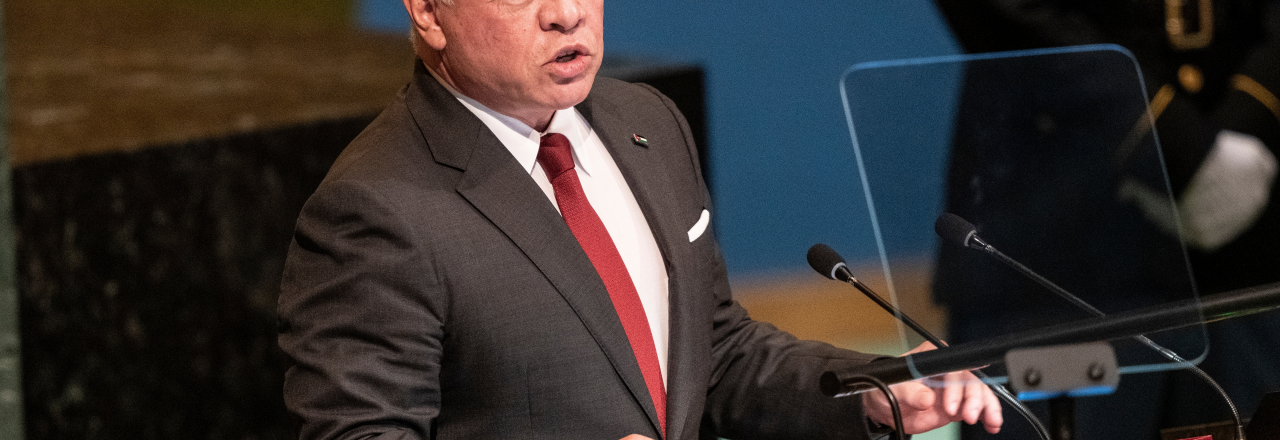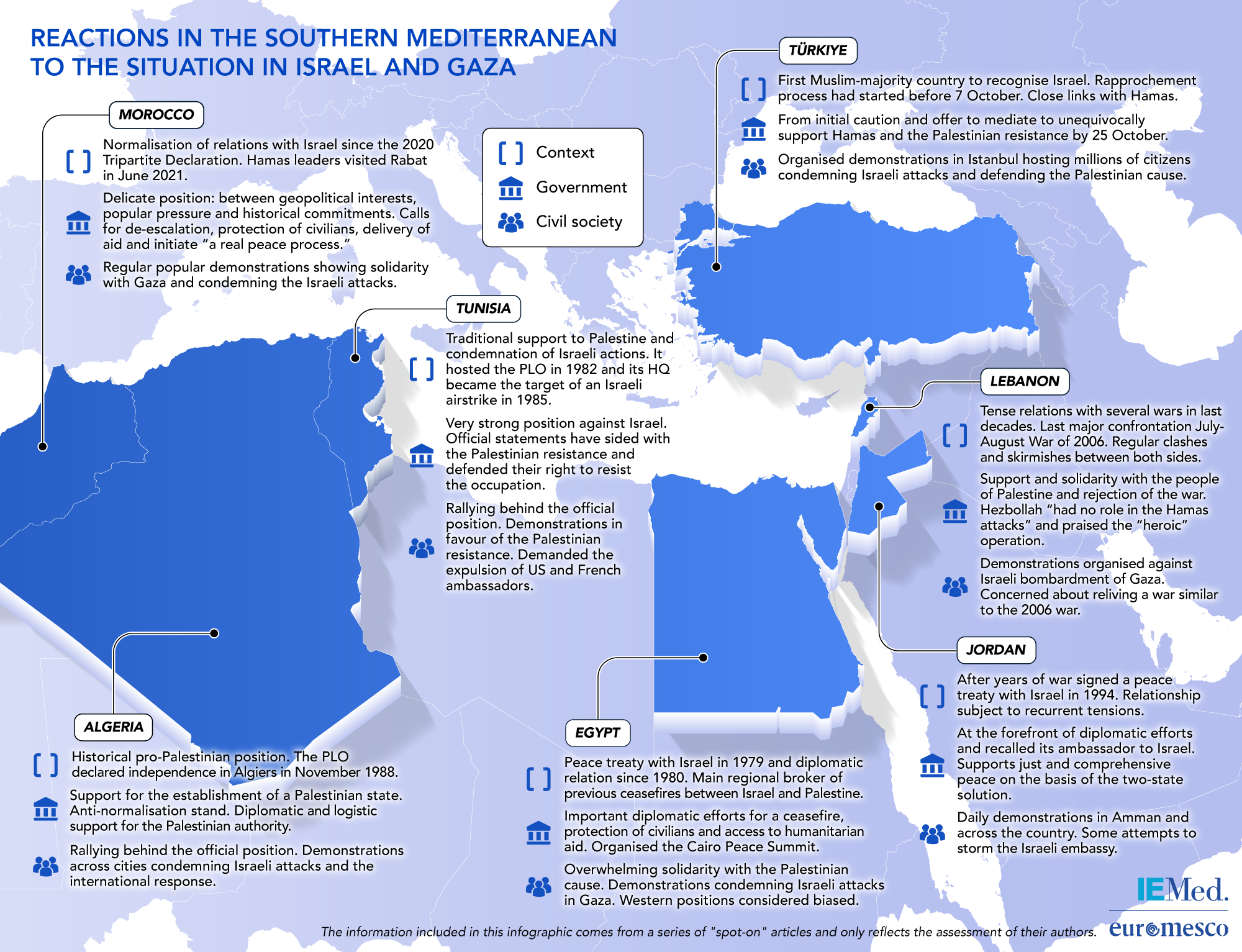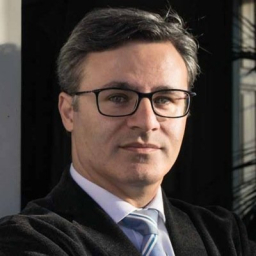
Spot on
Israel’s actions in Gaza and the West Bank pose an existential threat to Jordan
Abstract
The Kingdom of Jordan is used to standing on the edge of a precipice. Its neighbourhood is one of the most conflict-ridden in the world and the country’s resources are scarce. However, the outbreak of large-scale violence in Gaza following the Hamas attack on Israel on 7 October poses an existential challenge for the Hashemite kingdom. The country faces a combination of interconnected internal and external dangers it has not faced in decades. Jordan is at the forefront of diplomatic efforts to contain the effects of the war in Gaza and its possible spread to other parts of the Middle East. Meanwhile, King Abdullah II has been warning of the long-term pernicious effects of Western countries’ response to Israel’s actions against the populations of Gaza and the West Bank.
Jordan sounds the alarm bells
Jordan is used to walking tightropes in the complex geopolitics of the Middle East. However, the current war in Gaza and its potential ramifications pose an existential threat to the country’s stability. Jordan is already home to millions of Palestinian refugees from the 1948 and 1967 wars and their descendants. The terrifying escalation of violence in Gaza and the West Bank since 7 October, together with statements made by several Israeli officials, have reawakened long-standing fears that Israel would go ahead with the displacement of Palestinian populations into Jordan and Egypt. Both countries have warned that such a move would be a red line that could ignite the entire region. Jordan’s Prime Minister, Bisher Khasawneh, went as far as stating that any attempt to displace Palestinians from Gaza or the West Bank would be considered “a declaration of war”.
For King Abdullah II, the ongoing war presents a significant security and political headache. Since the outset of the latest unprecedented wave of violence, the King has been calling on the global powers to stop Israel’s unrelenting bombing campaign in Gaza, to implement a ceasefire and to end the siege of that densely populated enclave. He has repeatedly insisted that “the region will never be secure nor stable without achieving just and comprehensive peace on the basis of the two-state solution”, guaranteeing Palestinians their rights and freedoms, as the outbreak of violence in October has clearly demonstrated. The King has been engaged in a flurry of diplomatic efforts with international and regional leaders, urging them to help de-escalate the increasingly dangerous situation.
Queen Rania, who is herself of Palestinian descent, gave an interview to the CNN on 24 October in which she, like other Jordanian officials, condemned “the killing of any civilian whether Palestinian or Israeli”. However, the Queen denounced “the world’s reaction to this catastrophe” and the “glaring double standard” for failing to condemn the deaths of Palestinian civilians under Israeli bombardment in Gaza. The fact that Queen Rania has been delivering such strong messages in high-profile international media outlets shows the extent to which the monarchy views the situation as an existential threat to the stability of the country and the entire region.
In a speech during an emergency special session of the United Nations (UN) General Assembly on 26 October, Jordan’s Minister of Foreign Affairs, Ayman Safadi, stated that “Israel is making Gaza a perpetual hell on earth” and that “Israel cannot remain above the law”. He warned that “collective punishment is not self-defence; it is a war crime”. That same day, Jordan introduced a non-binding resolution at the UN General Assembly, which was adopted by a large majority of Member States, with 120 votes in favour, 14 against and 45 abstentions. The resolution called for an “immediate, durable and sustained humanitarian truce leading to a cessation of hostilities”, but it also showed how helpless the international community was when it came to stopping atrocities against civilians and liberating the hostages.

Popular anger and mobilisation
Since the war in Gaza began, thousands of Jordanians have taken to the streets daily in the capital Amman and across the country. Some even attempted to storm the Israeli embassy, a move that was prevented when the Jordanian police fired tear gas to disperse the demonstrators. Authorities also banned gatherings and rallies in the Jordan Valley and border areas. The country has seen numerous mass demonstrations urging the government to put an end to Jordan’s 29-year peace treaty with Israel. On 1 November, Jordan recalled its ambassador to Israel to reflect Amman’s condemnation of the “Israeli war that is killing innocent people in Gaza”. It also announced that Israel’s ambassador to Jordan, who left a couple of weeks earlier, would only be allowed to return if Israel ceased its bombardment of Gaza and the Palestinians there had full access to humanitarian aid.
Hamas and other Palestinian militant groups do not have widespread popular support among Jordanians, and for sure not in the ruling circles. However, the suffering of the Palestinian civilians that Jordanians see on a daily basis – and almost in real time – through conventional media and in their mobile phones is a central issue that generates strong emotions irrespective of origin and status. The Hashemite monarch, who is the custodian of the Muslim and Christian holy places in Jerusalem, has been complaining about the provocations by Israeli politicians, security forces and settlers in the holy city for a long time. For years, Jordan has warned of campaigns to change the status quo across the occupied West Bank through forced evictions and settler violence, supported by Israeli soldiers and police. This reality, which may have gone unnoticed for most of the world, helps explain Jordanians’ positions and reactions to events in the Occupied Palestinian Territories.
The longer the war in Gaza lasts and the bigger the destruction of lives and infrastructure gets, the more difficult the situation will be for the Jordanian monarchy. On the one hand, it needs to maintain a balance in its relations with its Western partners, while on the other hand, it has to respond to the demands of a public opinion that is outraged and frustrated at what it widely perceives as an Israeli war of aggression with the backing and complicity of the main Western powers. Inevitably, a comparison with the West’s reactions to Russia’s aggression against Ukraine comes to the mind of many Jordanians.
Bracing for a broader conflict
With no end in sight for the war between Israel and Hamas, Jordan is bracing itself for a broader conflict beyond Gaza. Any extension of the war to other fronts, such as Lebanon or the Gulf, would have spillover effects with profound regional ramifications. Jordan does not want to find itself in the crossroads of a larger regional war, thus its frustration with the inability – or sheer unwillingness – on the part of the U.S. and certain European governments to even secure a ceasefire after more than a month of “Israeli war crimes”. Even if the war does not expand beyond Gaza, it is already having adverse economic consequences for the kingdom in sectors like tourism, as well as foreign direct investment and cross-border trade.
The longer the war lasts, the bigger the damage will be for Jordan’s economy, which was already reeling from a decade of low economic growth, high public debt and an overall unemployment rate close to 25%. Growing socioeconomic pressures are a direct threat to social peace and political stability.
Officials and the general public in Jordan have long feared the plans of the Israeli right-wing and far-right parties to turn Jordan into the “alternative homeland” for the Palestinian people. Many share the conviction that Israel’s plan is to use brute force to transfer the Palestinian population from Gaza into the Sinai and also to expel Palestinians from the West Bank into Jordan. Statements by current Israeli ministers saying that “the voluntary migration of the Palestinians of Gaza to other countries of the world is the right humanitarian solution”, or announcing that “we are now rolling out the Gaza Nakba”, or stating that “dropping an nuclear bomb on Gaza is one option” only come to confirm such fears that are deeply rooted in the history of the conflict.
One more aspect that could fuel future conflicts is that of perceptions. In his public statements, King Abdullah II has expressed frustration at what many in the region perceive as double standards by Western powers when dealing with aggressions and human suffering in different parts of the world. During the international summit held in Cairo on 21 October, he voiced a widespread perception across the region when he said: “The message the Arab world is hearing is loud and clear: Palestinian lives matter less than Israeli ones. Our lives matter less than other lives. The application of international law is optional. And human rights have boundaries – they stop at borders, they stop at races, and they stop at religions”. He added that: “That is a very, very dangerous message, as the consequences of continued international apathy and inaction will be catastrophic – on us all”. Coming from one of Washington’s closest Arab allies (the first Arab leader who spoke with and visited President Joe Biden following his election), these words should be seen as an unequivocal warning of the risks of failing to act before it is too late



